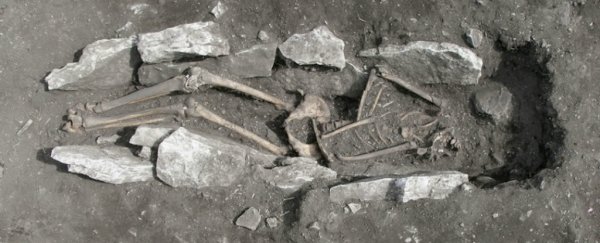A team of archaeologists has uncovered the remains of a teenage boy who died some 3,000 years ago on the slopes of Mount Lykaion - a region of Greece that has long been associated with the practice of offering animal sacrifices to Zeus.
The find points to the possibility that ancient Greeks performed human sacrifices - a darker part of the country's history that, until now, has been chalked up as fiction.
"Several ancient literary sources mention rumours that human sacrifice took place at the altar [of Zeus], but up until a few weeks ago there has been no trace whatsoever of human bones discovered at the site," one of the archaeologists, David Gilman Romano from the University of Arizona, told Mazin Sidahmed at The Guardian.
"Whether it's a sacrifice or not, this is a sacrificial altar … so it's not a place where you would bury an individual. It's not a cemetery."
Members of the Mount Lykaion Excavation and Survey Project, which includes archaeologists from the US and Greece, found the remains inside a giant 'ash altar' on the slopes of the mountain's southern peak - an area that researchers from around the world have been excavating since 2007.
Despite their efforts, only about 7 percent of the altar – which was built to honour Zeus about 5,000 years ago – has been uncovered. Most often, the team uncovers coins, cups, figurines, and the charred remains of sheep and goats, which were burned as offerings.
This is the first time human remains have been found at the altar.
Though the recently uncovered remains could shed a new light on ancient Greek religious practices, it's hard to say this early on if the boy was killed at the altar or had died elsewhere and was buried at the site. Either way, the find has archaeologists and historians pretty excited.
"On the one hand, there's this picture of Greece as the cradle of civilisation, the birthplace of democracy, of philosophy, of rational thinking – but on the other hand we have these cruel, cruel myths," Jan Bremmer from the University of Groningen in the Netherlands, who wasn't involved in the discovery, told The Guardian.
One of those myths, says Owen Jarus from Live Science, was the work of Pausanias, a writer who lived between 110 and 180 AD.
In the legend, which Pausanias likely heard from someone else, a king named Lycaon sacrifices a small boy at the altar of Zeus, pouring the boy's blood over the altar. When finished, the king transforms into a wolf.
The team is yet to publish their discovery in a peer-reviewed journal, but is still in the midst of analysing the remains. The excavation of the altar is expected to continue in the coming years, and maybe they'll find new clues to connect the legend to reality.
